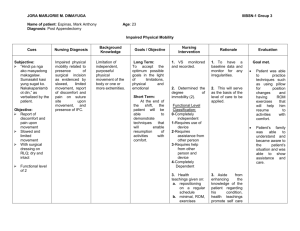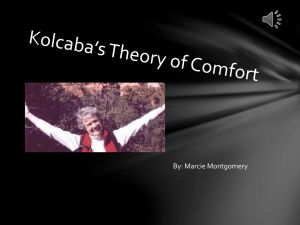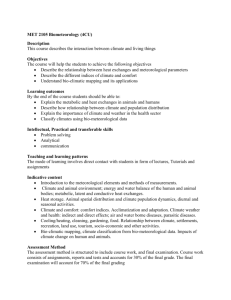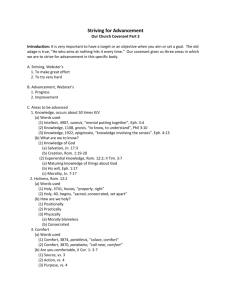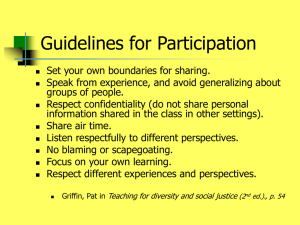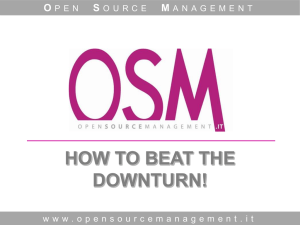Sunday 7th December
advertisement
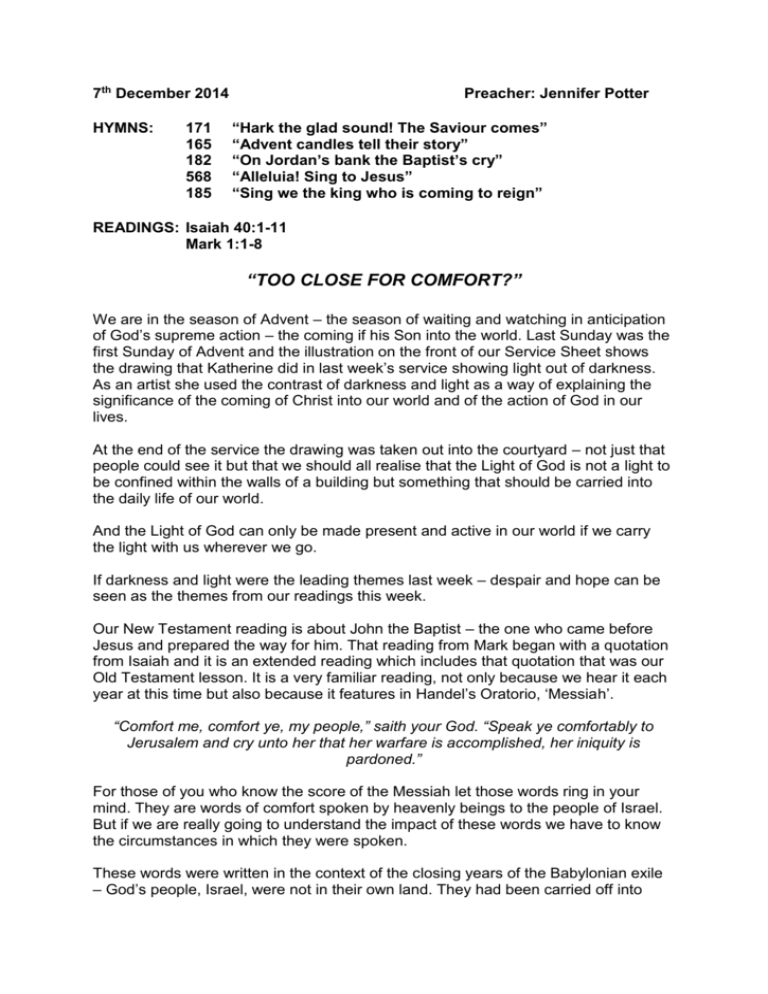
7th December 2014 HYMNS: 171 165 182 568 185 Preacher: Jennifer Potter “Hark the glad sound! The Saviour comes” “Advent candles tell their story” “On Jordan’s bank the Baptist’s cry” “Alleluia! Sing to Jesus” “Sing we the king who is coming to reign” READINGS: Isaiah 40:1-11 Mark 1:1-8 “TOO CLOSE FOR COMFORT?” We are in the season of Advent – the season of waiting and watching in anticipation of God’s supreme action – the coming if his Son into the world. Last Sunday was the first Sunday of Advent and the illustration on the front of our Service Sheet shows the drawing that Katherine did in last week’s service showing light out of darkness. As an artist she used the contrast of darkness and light as a way of explaining the significance of the coming of Christ into our world and of the action of God in our lives. At the end of the service the drawing was taken out into the courtyard – not just that people could see it but that we should all realise that the Light of God is not a light to be confined within the walls of a building but something that should be carried into the daily life of our world. And the Light of God can only be made present and active in our world if we carry the light with us wherever we go. If darkness and light were the leading themes last week – despair and hope can be seen as the themes from our readings this week. Our New Testament reading is about John the Baptist – the one who came before Jesus and prepared the way for him. That reading from Mark began with a quotation from Isaiah and it is an extended reading which includes that quotation that was our Old Testament lesson. It is a very familiar reading, not only because we hear it each year at this time but also because it features in Handel’s Oratorio, ‘Messiah’. “Comfort me, comfort ye, my people,” saith your God. “Speak ye comfortably to Jerusalem and cry unto her that her warfare is accomplished, her iniquity is pardoned.” For those of you who know the score of the Messiah let those words ring in your mind. They are words of comfort spoken by heavenly beings to the people of Israel. But if we are really going to understand the impact of these words we have to know the circumstances in which they were spoken. These words were written in the context of the closing years of the Babylonian exile – God’s people, Israel, were not in their own land. They had been carried off into exile by the armies of Babylon. The people were scattered. They were demoralised. Their plight was seen as punishment for their unfaithfulness. And there was worse than that. The holy city of Jerusalem had been trampled over by the enemy and lay in ruins. The situation of the people was desperate. They were a people on the brink of losing all hope, all confidence for the future. Into their despair, the prophet of Isaiah 40, a prophet whose name we actually do not know, speaks a remarkable word, a word to thrill the ears of his hearers. Unlike most Old Testament prophets who were prophets of doom, the prophet of our reading speaks a word of encouragement, a word of empowerment – a message of Good News. “Comfort, O comfort my people,” says your God. “Speak tenderly to Jerusalem and cry to her that she has served her term, that her penalty is paid.” These words are a command from God to the heavenly beings – even to the prophet himself – to bring good news to the people. They are to bring ‘comfort’ to the people that is to strengthen them and to assure them that God is going to act to transform their situation. So to a people feeling devastated by the loss of Jerusalem, the loss of their homeland – the message is one of hope for a radically new era, a move from judgement to forgiveness and from exile to restoration. And these words are not from a distant heavenly being but from a God who has a personal relationship with his people – ‘comfort my people, says your God.’ This is a radical message of personal concern from God to his people. Can we try to capture how thrilling this message was to the people of Israel? It is very difficult to do so. What we can do is to try to look for modern-day parallels so that we can grasp how radical God’s message of comfort is for his people – in all generations. Desperation and despair were the lot of the people exiled in Babylon, exiled from Jerusalem which had been laid waste. We do not need to look far to see people in our world for whom despair, complete despair is ‘too close for comfort’, seemingly too close for any message of comfort. Imagine remote villages in Liberia, Guinea or Sierra Leone – places where the Ebola virus is rampant but where little medical aid is available. Imagine parents who have seen their children die and children who have seen their parents perish. Whole communities have been devastated. Can they receive comfort? Or we might imagine the villages of Northern Syria and Iraq where Christians and other minority groups have been forced to flee ahead of the onslaught of the socalled Islamic State. Now, as winter approaches, millions of people are living in makeshift shelters with no possibility of returning to their home areas. As with the exiled people of Israel, can they receive comfort? Or let us come closer to home. This week we have heard in the media about the extent of modern slavery – slavery not in distant places but here in Britain, here in London – an estimated 13,000 people, mostly but not exclusively women, who are held in slave-like conditions as sex-slaves or as domestic slaves completely under the control of other people. What kind of comfort can be brought to them? And if we want to become even more local there are homeless people who this morning will have queued for breakfast at the Whitechapel Mission having spent a cold night sheltering in a shop doorway on a bed of cardboard. What kind of comfort can be brought to them? Let us return for a moment to our reading from Isaiah. Israel is to be comforted, her sins pardoned and the exile put behind. With these words the experience of exile is transformed. The exile is no longer seen as just divine retribution but as an experience with the potential for divine redemption. In the passage the frailty of humankind is acknowledged, “all people are grass their constancy is lie the flower of the field.” People will always stray, be weak and lose heart but for those with ears to hear, God’s word of comfort and empowerment can redefine reality. That is the claim that stands at the heart of this word of comfort. The very speaking of the word of comfort transforms reality. The exiles of old and the exiles of today and we who hear this word are now being invited to re-imagine the world on the basis of this vision. In other words we are being challenged out of a mind-set which says, ‘this is how the world is – there is nothing to be done about it.’ We are being challenged to speak words of comfort, words which will empower others not only to imagine that things can be different, but to speak about how things can be different and work for a different, a better world. God’s word is still active and powerful in the world and can still have a a decisive impact without conforming to the powers and processes of our time. If we are ready to hear the radical word of comfort in Isaiah 40 – it is a word which defies logic. It is a word which marks the season of Advent as a period which redefines reality. God is coming again to speak tenderly to his people, to comfort them and give them a vision of a new earth as well as a new heaven. Last week we were urged not just to be recipients of the Light of God but bearers of that light into the world. This week we are being urged not just to be comforted by a God who speaks tenderly to our heart but to be bearers of that comfort and concern into the world. So we will work against any suggestion that Ebola is God’s judgement on people. We will speak to people to encourage support for those helping with the situation. Some of us with medical qualifications will even volunteer to go and assist. For the Christians and other minorities in Syria and Iraq (and indeed other places) we will not just say, ‘it is a long way away, what can we do about it?’ We will pray for them, urge Government and organisations to support them and perhaps even campaign for some to be able to settle here. And what about modern slavery? We will become more aware of what is going on right under our noses. We will report any suspicious instances we might become aware of, we will help victims and we shall speak out about it. And homelessness – an election is coming up in a few months’ time – this will be a hot issue – so many people homeless at a time when so many properties are not being lived in. We can speak out to our councillors and to candidates for election. Despair and desperation do not have to be ‘too close for comfort’ in our world for we can speak a powerful word that not only brings timely comfort but which speaks of a totally different world, a radically different future – the future we wait for expectantly this Advent. So as we shall say in our Communion Service: “Come, Lord Jesus Come and help us to live in the light of your coming And give us a longing to do your will. Amen
